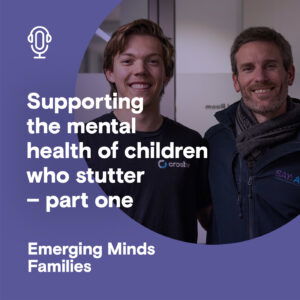Supporting the mental health of children who stutter – part one
Stuttering impacts 70 million people around the world, including 9% of all children. Physically, stuttering can take the form of elongations, repetitions and blocks in speech, but it can also have an effect on mental health and wellbeing. Children who stutter may experience isolation, self-esteem and confidence issues, social anxiety, and even self-harm or suicidal ideation. This highlights the need for more conversations around supporting the mental health and wellbeing of children who stutter.
This episode is the first in a two-part series on supporting the mental health of children who stutter. Host Nicole Rollbusch is joined by Rich Stephens, President of SAY:Australia (the Stuttering Association for the Young – Australia), and Mitchell, who has been involved with SAY:Australia for the past four years, originally as a participant and now as a mentor to other children and young people who stutter.
In this episode, Rich and Mitchell talk about the activities of SAY:Australia, how common stuttering is and what it can look like, along with the impact that speaking with a stutter can have on children’s mental health and wellbeing, and how we can support them.

In this episode you will learn:
- about SAY:Australia and what supports and activities they provide to children who stutter [00:49]
- how common stuttering is [04:05]
- what stuttering looks like in children [05:32]
- the impact speaking with a stutter in childhood can have on children’s mental health [10:30]
Further information and resources:
- My Stammering Tap [Video]
- My Stammering Child [Video]
